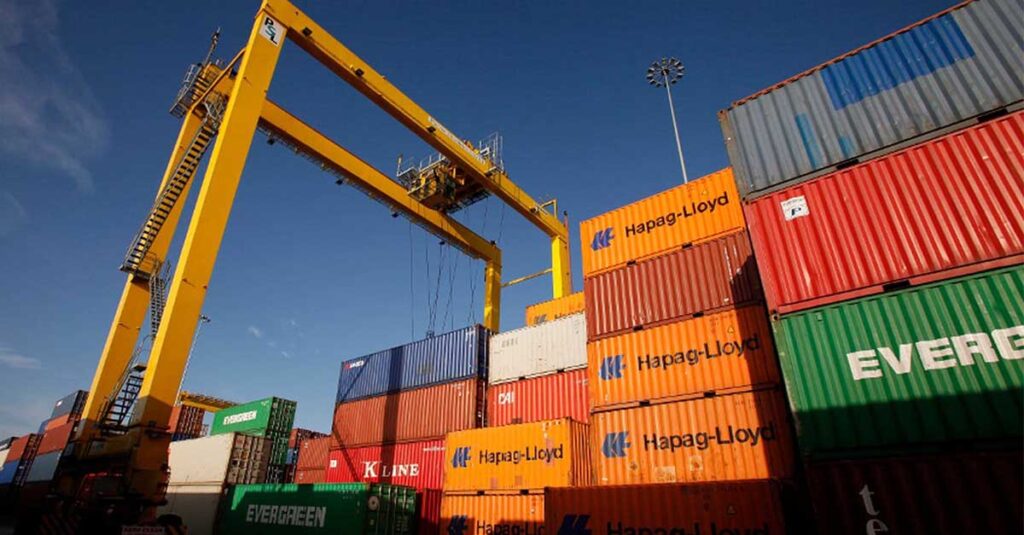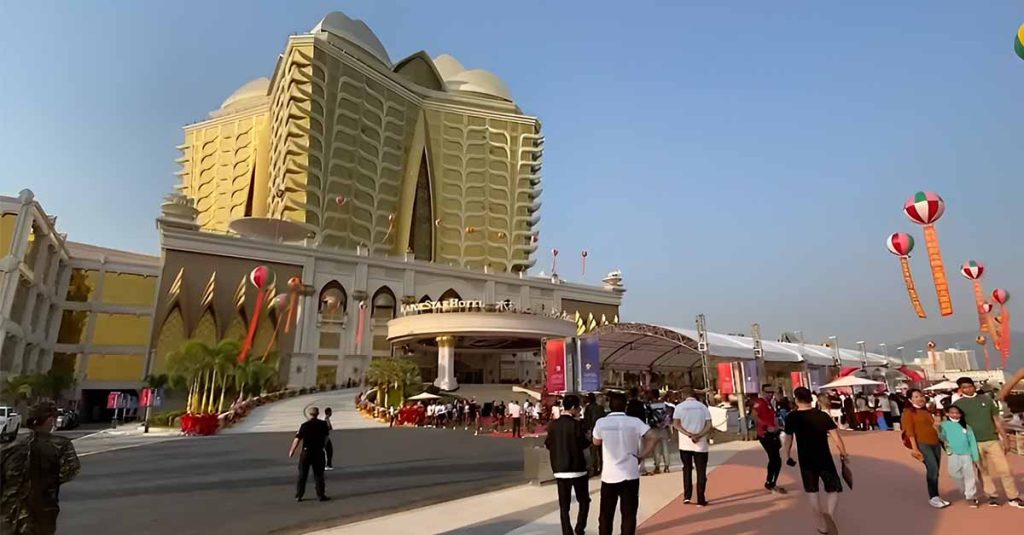The Cambodian Ministry of Public Works and Transport is taking steps to improve the transportation of Cambodian agricultural products to Chinese markets by exploring a new trade route through Laos.
Kong Vimean, a spokesperson for the Ministry, says Chinese investors and advisors had expressed concerns about the rising expenses and complications in using neighboring countries as a transit route to China.
In response to this, the ministry is coordinating plans to facilitate Chinese investors in transporting Cambodian agricultural goods via to China via Laos, employing the country’s new high-speed train service.
The proposed route will begin in Phnom Penh and traverse Kampong Cham, Tbong Khmum, Kratie, and Stung Treng provinces before entering Laos and moving onward to China.
Vimean emphasized that Cambodia, Laos, and China have already established cross-border transport procedures and agreements, ensuring a smooth flow of goods.
By opting for the Laos route, the Chinese companies expect to lower costs and experience simplified procedures, unlike the hurdles faced when using the Thai and Vietnamese routes. Though the distance covered through Laos is slightly longer, the advantages of reduced expenses and streamlined formalities are more attractive to these companies.
The Cambodian Ministry of Public Works and Transport is enthusiastic about boosting Cambodia’s agricultural sector on the global platform and is open to facilitating similar arrangements for other Chinese companies. With this move, exports of various agricultural products such as mangos, durian, cashew nuts, pineapples, and milled rice to China are expected to increase significantly.
Sin Chanthy, President of the Cambodia Logistics Association, praised the new trade route, stating that it would greatly benefit the association.
“The transport of agricultural products via Stung Treng will be more profitable than the use of the ports of Sihanoukville and Phnom Penh, which are far away. Thanks to the transport ministry’s coordination of the new infrastructure, it will also be simpler,” he said.
The Chinese companies plan to establish a dry port in Stung Treng town, leading to increased profitability for transporting agricultural products from the province. Chanthy also highlighted that the coordinated infrastructure efforts by the transport ministry would make the process much simpler compared to utilizing distant ports like Sihanoukville and Phnom Penh.
By: Latsamy Phonevilay
Source: The Laotian Times
JAKARTA, 25 July 2023 – In an effort to promote circular economy transition in the region, over 50 government and business representatives from ASEAN Member States (AMS) came together for the Regional Policy Dialogue on ASEAN MSMEs Participation in Circular Economy on 25-26 July in Jakarta.
Hosted by Indonesia’s Ministry of Cooperatives and SMEs, the dialogue served as a platform for industry and policy experts to shed light on recent policy trends in ASEAN and AMS and provide insights on successful and innovative circular business models.
The dialogue culminated with a decision to produce policy recommendations on ASEAN MSMEs’ participation in the circular economy. The recommendations are aimed to promote regional cooperation in the MSME sector to identify challenges, opportunities, and share good practices in promoting MSME participation in the circular economy.
In his opening speech, Deputy Minister for SMEs for Indonesia’s Ministry of Cooperatives and SMEs Hanung Harimba Rachman said, “As the chair of ASEAN in 2023, Indonesia has adopted the theme: “ASEAN Matters: Epicentrum of Growth” which focuses on growth and prosperity. We aim to strengthen ASEAN to become a fast-growing, inclusive and sustainable economic region.”
In his remarks, Deputy Secretary-General of ASEAN for ASEAN Economic Community Satvinder Singh highlighted the challenges stemming from the overuse of finite natural resources and urged ASEAN to come together and explore alternative resources. “Embracing the circular economy is imperative for ASEAN, not only to safeguard our livelihoods from future challenges such as climate change and food security but also for ASEAN as a region to remain relevant and competitive in international trade,” he said.
Echoing this sentiment Shameer Khanal, Deutsche Gesellschaft fuer Internationale Zusammenarbeit (GIZ) GmbH Lead Advisor/Cluster Coordinator ASEAN, underlined the importance of capacity building and public support schemes for MSMEs to prepare for new business opportunities and access to foreign markets.
“In this context, GIZ, with the support of the German Government, focuses on collaborating thematically with ASEAN on cross-border trade while remaining open to cooperation and policy dialogues on all emerging topics.” He also encouraged MSMEs to utilise the ASEAN Access, a portal designed to facilitate the internationalisation of MSMEs in all sectors, including those with circular business models, through business matching, market talks, and capacity building activities.
The policy dialogue is an initiative under ASEAN Access on the occasion of Indonesia’s ASEAN Chairmanship 2023. The event was organised in consultation with the ASEAN Coordinating Committee on MSMEs and the Task Force on ASEAN Access with support from GIZ as funded by the Federal Ministry of Economic Cooperation and Development through the GIZ SME Promotion in ASEAN II project.
Original News: here
Thailand’s automotive market contracted 5% year on year in the first six months of this year, with total vehicle sales reaching 406,131, the Federation of Thai Industries (FTI) said on Thursday.
Toyota topped the chart with 136,859 vehicles sold from January to June, dropping 3.6% from the year-ago period. Isuzu was second in terms of vehicles sold, 86,281, but its sales plunged 21.5% year on year. Honda sold 46,134 vehicles, up 14.9% from the first six months of last year.
The FTI’s Automotive Industry Club said that all manufacturers of one-tonne pickup trucks (Toyota, Isuzu, Nissan, and Mitsubishi) saw sales fall in the first half of the year due to declining demand.
It said one electric vehicle (EV) manufacturer made it into the top 10 in terms of sales: Great Wall Motor, which was 10th with sales of 6,222 vehicles in the six month period, up 19% year on year.
Narong Sritalayon, managing director of Great Wall Motor Thailand, said the sales increase reflects growing confidence in Chinese EVs.
Popular models among Thai customers are Ora Good Cat (2,600 units sold), Haval H6 (2,051 units sold), and Haval Jolion (1,571 units sold), he said.
Narong added that Great Wall Motor plans to introduce nine more EV models over the next three years.
Meanwhile, Rever Automotive Ltd, the importer of BYD EVs from China, said BYD had the most registered EVs in Thailand in the first half of the year.
With 11,168 units being registered, BYD EVs are leading the market. Neta V, another Chinese manufacturer, was second with 5,955 units registered this year.
BYD is building its first manufacturing facility in Thailand at WHA Industrial Estate in Rayong province, aiming to produce 150,000 EVs per year from 2024.
Source : THE NATION THAILAND
Koh Tao of Surat Thani province saw a record number of daily tourist arrivals last week, while nearby Koh Samui expects nearly 30,000 visitors from hotel bookings this month.
Koh Tao’s tourist organization reported that 3,106 tourists arrived to the island via boats on July 28, setting a new one-day record for the island. The increase in arrivals corresponded with the start of a six-day government holiday ending on August 2.
Provincial Governor Wichuwat Jinto explained that around 90% of the visitors were foreign tourists who will travel to Koh Phangan for the famous Full Moon Party, held at Hat Rin Beach on August 3.
Neighboring Koh Samui meanwhile reported that the number of tourists arriving through the island’s airport exceeded 141,400 for the month of July. Authorities expect that another 30,000 visitors will visit the island this month based on hotel reservations, bringing total visitors to the island by air to around 171,800.
In response to growing demand, Ratchaporn Poonsawat, President of the Tourism Association of Koh Samui, said the association has requested airlines to boost the number of daily flights, as limited flights have led to cancellations for many people who made advance room reservations.
This proactive measure aims to prepare for the anticipated influx of tourists during the upcoming peak season, which is expected to generate around 5 billion baht for the island’s economy during the period.
Source : NATIONAL NEWS BUREAU OF THAILAND
Rice exporters in Thailand and Vietnam are re-negotiating prices on sales contracts for around half a million metric tons for August shipments, two trade sources said, as India's ban has tightened global supplies.
Exporters are rushing to cover rice supplies from farmers who have raised prices following a surge in the world market, putting millions of dollars worth of deals at risk.
Rice farmers and exporters who had bought shipments in advance are set to gain from tightening world supplies, while buyers are likely to lose despite booking cargoes before India's announcement of ban as sellers renegotiate contracts to get higher prices.
Rice importers have no choice but to pay higher rates as sellers will default on contracts, given the substantial increase in prices of the staple, traders said.
India late last month banned white rice exports amid uncertainty over domestic production, heightening food supply worries among importers of the staple in Asia and Africa.
"Prices have gone up since India banned exports and it is difficult for suppliers to fulfil contracts signed at lower prices," said one Singapore-based trader, with direct knowledge of talks.
Thailand and Vietnam, the world's No. 2 and 3 exporters respectively, are estimated to ship more than one million metric tons of rice in August. India is the world's biggest rice exporter accounting for around 40% of global supplies.
Global prices of key rice varieties shipped worldwide have climbed by about $80 per metric ton since India imposed the ban on July 20, they said.
Thailand's 5% broken rice prices climbed to $625 per metric ton, versus $545 around two weeks ago, while similar variety from Vietnam has risen to $590 a metric tone as compared with $515-$525.
"The current prices are way higher than the contracted prices," said one trader in Ho Chi Minh City. "The export price surge has resulted in a sharp rise in domestic paddy prices. Several traders are now rushing to sped up their purchases from farmers."
While large exporting houses are likely to fulfil contracts, smaller trading companies are expected to default on shipments, traders said.
Importers, including the Philippines, are likely to seek direct deals with governments of exporting countries to ensure critical food supplies.
The Philippines will boost its inventory of rice, including imports, with the government encouraging private traders to ramp up their purchases, a senior agriculture official said on Tuesday.
Source : REUTERS
Energy Absolute Plc, a Thai company, is partnering two major Chinese battery manufacturers, Eve Energy Co Ltd (Eve), and Sunwoda Mobility Energy Technology Co Ltd (Sunwoda), to conduct a feasibility study on establishing battery cell plants in Thailand.
Energy Absolute deputy CEO Amorn Sapthaweekulof said that EA has signed memorandums of understanding (MoUs) with Eve and Sunwoda, both large battery manufacturers in China, who are interested in expanding the battery market in Thailand.
The partners would jointly study and set up battery cell production plants with a capacity of 6 gigawatt hours (GWh) in Thailand, he said.“The results of this study are expected to lead to the establishment of high-capacity battery cell production plants with competitive costs in the electric vehicle (EV) and energy storage system industries, to meet the demand for batteries in EA's group of companies and in the Thai and Asean markets. This move will support the manufacturing of electric vehicles in Thailand with continuous investment,” he added.
After the successful completion of the feasibility study, EA plans to announce Amita Technology (Thailand) Co Ltd as a partner from China to build a Prismatic Battery Cell production plant using advanced automated manufacturing technology with low raw material costs from a Chinese partner with complete raw materials supply chain. The goal is to develop new batteries that are efficient and highly safe, including expanding battery pack production to achieve production costs close to those of batteries manufactured in China, he said. This factory will produce one of the largest battery cells in Thailand and cater to the battery demand in Thailand and Asean. The target clients will be EV manufacturers and energy storage system manufacturers. The initial production capacity will be 6GWh per year in Thailand to support the 30@30 policy, he said.
This policy stipulates that Thailand must boost manufacturing capacity of zero-emission vehicles (EVs) by 30% by 2030. The 30@30 policy also promotes investment in battery production for electric vehicles by the government, making this project feasible and instilling confidence in the investors. Therefore, the government should implement measures to accelerate and promote this policy to help Thailand become a centre for lithium-ion battery production and a leader in the electric vehicle industry in Asean in the future, Amorn said.
Eve is the third-largest lithium-ion battery technology service provider in China, with a production capacity of around 360GWh, using state-of-the-art technologies for Internet of Things (IoT), electric vehicles, and energy storage systems. Eve provides services to leading global car brands, such as BMW, Daimler, Hyundai, and Jaguar Land Rover, with sales bases expanding to the United States, Germany, Malaysia, and other regions. It is also one of the top 10 leading companies in battery installation services.
Sunwoda is the fifth-largest lithium-ion battery manufacturer for EVs in China and ranks ninth in the global market, with a production capacity of over 100GWh per year. Sunwoda plans to increase its capacity to 138GWh by 2568 and aims to enter the European market and establish battery production plants in Hungary. Sunwoda is recognised as a fast-charging battery manufacturer and has been ranked in Tier 1 of the benchmark for battery manufacturers for car brands like Dongfeng Maxus, Geely, Li Auto, Huawei, XPeng, Renault, and Nissan.
Source : THE NATION THAILAND
ASEAN possesses the essentials necessary to establish itself as a thriving hub for EV manufacturing. Indonesia — the largest country in the region — boasts the world’s largest nickel deposits. It is also a major producer of tin and copper which are essential for EV batteries.
Thailand — the largest producer and market for EVs in the region — is offering incentives to establish itself as an EV production base. This strategy will result in lower import duties and make locally produced EVs more affordable.
Electric vehicle (EV) popularity has been surging as countries increasingly incentivise their citizens to transition to EVs to reduce carbon emissions. China leads the way, manufacturing approximately 44 per cent of all EVs between 2010 and 2020 and 77 per cent of lithium-ion batteries in 2022. But the ongoing global supply chain diversification will transform this landscape, presenting a remarkable opportunity for ASEAN.
Vietnam’s abundant nickel reserves make it an ideal destination for battery production. Leading the charge is Vietnam’s prominent private conglomerate VinFast which is constructing a 14 hectare battery factory. Its annual capacity of 5 gigawatt-hours is equivalent to 30 million battery cells.
In 2023, ASEAN leaders issued a declaration aimed at cultivating a regional EV ecosystem, showcasing their political commitment to developing the region’s EV supply chain and positioning it as a global EV manufacturing hub. This initiative enhances the implementation of the ASEAN Economic Community, which is the region’s ambitious economic integration initiative.
But the most daunting hurdle lies in the establishment of regional standards for EVs, a pivotal strategic measure in the declaration. Establishing these standards likely involves developing an ASEAN-wide mutual recognition arrangement (MRA). The journey ahead is arduous. The ‘ASEAN Way’ of developing a MRA entails lengthy negotiations among ASEAN member states, as demonstrated by the 14-year marathon of the ASEAN Mutual Recognition Arrangement on Type Approval for Automotive Products. Such a protracted process risks undermining the foundation of the EV ecosystem that ASEAN seeks to cultivate.
Chinese companies, GSC Aion New Energy Automobile and Svolt Energy Technology, have already committed large investments to EV production and battery production in Thailand. The Thai government has been actively promoting investments in the EV industry, offering incentives and benefits to investors from around the world.
The arrival of Chinese manufacturers would help boost the popularity of EVs in Thailand, which is the second largest car market in ASEAN. In the first half of 2023, 31,000 EVs were registered in Thailand, triple the number registered in all of 2022.
Source : Thailand Business News
























